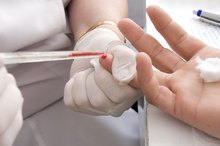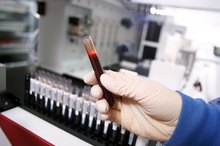Vitamin B-12 for Lymph Node Health
Your lymph nodes, located primarily on either side of your neck, under your chin and in your armpits and groin, are usually not noticeable. If yours become swollen, they might indicate either a passing infection or serious chronic disease. Among the nutrients associated with lymphatic abnormalities is B-12, a vitamin that people with limited nutrition and/or older adults might fail to utilize or consume adequately. Abnormal B-12 levels can contribute to or mask an underlying health problem that might be causing your lymph-node symptoms.
If you are experiencing serious medical symptoms, seek emergency treatment immediately.
Infectious Causes
Strep throat and ear or tooth infections cause inflammation in the lymph glands, as do measles, mononucleosis and human immunodeficiency virus, or HIV. If your lymph nodes are swollen and painful, an infection might be generating symptoms 1. If a blood test reveals low body levels of vitamin B-12, you might also have pernicious anemia, a form of severe vitamin B-12 deficiency brought on by insufficient stomach acid and intrinsic factor, effects commonly seen in older adults and people infected with HIV.
Immune System Problems
B12 Levels in Skim Milk
Learn More
Lymphoma and lymphocytic leukemia are forms of cancer that can affect your lymph nodes and your B-12 levels 3. If your lymph nodes swell noticeably, but don’t cause pain, the symptom might signal cancer. Additional physical signs of these diseases might include fatigue, weakness and weight loss -- symptoms shared with pernicious anemia. Cancer can co-exist with unrelated anemia, and lymph-node symptoms of cancer can coincide with related anemia, such as B-12 deficiency that precipitates leukemia.
- Lymphoma and lymphocytic leukemia are forms of cancer that can affect your lymph nodes and your B-12 levels 3.
- Cancer can co-exist with unrelated anemia, and lymph-node symptoms of cancer can coincide with related anemia, such as B-12 deficiency that precipitates leukemia.
Physical Exam
To determine the source of swollen lymph nodes, fatigue, weight loss and other symptoms, see your physician 1. A physical exam will evaluate the size of lymph-node swelling and the presence or absence of pain. Glandular lumps that aren’t painful might prompt a bone marrow test for possible cancer. A visual check that affirms abnormal skin and nail color might indicate likely B-12 deficiency. A complete blood count or targeted B-12 blood test might be ordered.
- To determine the source of swollen lymph nodes, fatigue, weight loss and other symptoms, see your physician 1.
- A visual check that affirms abnormal skin and nail color might indicate likely B-12 deficiency.
Testing
What Is a Normal B12 Count?
Learn More
Distinguishing cancer from vitamin-deficiency anemia can be difficult. According to a study in the 2004 “Southern Medical Journal,” B-12 deficiency causes changes in bone marrow that are similar to those seen in acute lymphocytic leukemia 38. This can confound a preliminary diagnosis. Simply taking extra vitamin B-12 via diet or supplements won’t cure lymph-node symptoms or underlying problems. Only complete testing by your health care provider can determine whether you have swollen lymph nodes from a noncancerous cause that happens to occur at the same time 1.
Related Articles
References
- Mayoclinic.com: Swollen Lymph Nodes
- MedlinePlus: Acute Lymphocytic Leukemia
- MedlinePlus: Lymphoma
- American Journal of Gastroenterology: Primary Gastric Lymphoma Presenting With B-12 Deficiency and Achlorhydria
- Annals of the New York Academy of Sciences: Micronutrient Deficiencies -- A Major Cause of DNA Damage
- Gaddey HL, Riegel AM. Unexplained Lymphadenopathy: Evaluation and Differential Diagnosis. Am Fam Physician. 2016;94(11):896-903.
- Von tresckow B, Moskowitz CH. Treatment of relapsed and refractory Hodgkin Lymphoma. Semin Hematol. 2016;53(3):1805. doi:10.1053/j.seminhematol.2016.05.010
- American Cancer Society. Lymph Nodes and Cancer.
- American Cancer Society. Non-Hodgkin Lymphoma.
Writer Bio
Nancy Clarke began writing in 1988 after achieving her Bachelor of Arts in English and has edited books on medicine, diet, senior care and other health topics. Her related affiliations include work for the American Medical Association and Oregon Health Plan.









